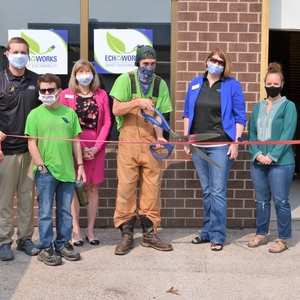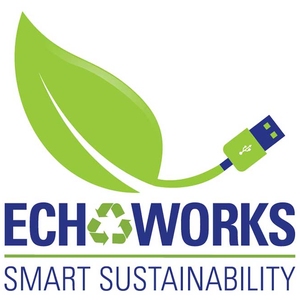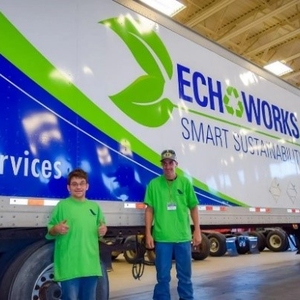EchoWorks: An Electronics Recycling College-Community Partnership
Western Dakota Technical College
Project Overview
There are more than a thousand toxic substances associated with electronic waste (e-waste), and improper disposal can lead to soil, water, food, and air contamination. E-waste is the fastest growing hazardous solid waste in the world. In order to promote sustainability, save landfill space, and most importantly protect the health of our community, Black Hills Works, a non-profit that employs people with disabilities, partnered with Western Dakota Technical College (WDTC) to establish an E-Recycling facility called EchoWorks. Founded in December 2019 and located on the campus of WDTC, EchoWorks has been successful in a variety of ways, including providing an integrated work environment for people with disabilities, utilizing students and faculty from key programs on campus, including Environmental Engineering, Electrical Trades, and Truck Driving, and collecting and processing hundreds of thousands of electronic waste.
Background
EchoWorks, a division of Black Hills Works, is a social enterprise that recycles electronic waste and employs people with disabilities. Located on the campus of Western Dakota Technical College, located in Rapid City, South Dakota, EchoWorks provides an integrated work environment for people with disabilities, while also utilizing skills of technical students from a variety of programs: Environmental Engineering, Electrical Trades, and Truck Driving.
Our eRecycling facility is a member of CyclePoint with SourceAmerica. CyclePoint is an eRecycling network that offers communities convenient, safe and secure electronics disposal.
Electronic waste is the fastest growing segment of municipal waste in the world. Nearly 75% of old electronics continues to be stored in households because of the unavailability of convenient recycling options. By law, the Rapid City landfill cannot accept electronics, even to hold for EchoWorks, so citizens are left with few options for disposal or recycling. The lack of options can contribute to improper disposal of e-waste, where the more than 1,000 toxic substances associated with e-waste can lead to soil, water, food and air contamination.
Echo Works offers electronic recycling services to the public and business community through their partnership with Western Dakota Tech, western South Dakota's only technical college. The goal is to re-purpose obsolete and unused electronics and to discard data in a confidential and secure manner. In this way, we contribute to environmental health, create sustainable jobs for people with disabilities, and contribute to the technical workforce development of the region.
Western Dakota Tech has a history of Sustainability projects led by the Environmental Engineering Program Director, including an on-campus apiary (approximately 40 hives) and associated community education courses related to beekeeping and an annual beekeeping conference, a National Science Foundation-Award winning aquaponics project, a geothermal greenhouse project, on campus and community recycling efforts (plastics, metals, paper, Christmas lights), Black Hills Winter Farmer's Market partnership, annual City of Rapid City Earth Day Expo and Plug-In America events, and advising a student club, the Environmental Action Team.
Goals
- To create sustainable jobs for people with disabilities
- To contribute to technical workforce development through training of Environmental Engineering Technicians, Electrical Trades Technicians, and Truck Drivers
- To raise awareness of recycling and inform residents on what and how they can recycle
- To divert electronics from local landfills
- To maintain data confidentiality
- To form community partnerships
Implementation
Initially launched several years ago, EchoWorks was not sustainable at that time primarily due to the prohibitive cost of transporting of electronic waste to an out-of-state recycling facility, the closest such facility to Rapid City. A September 2019 grant from the Black Hills Area Community Foundation and a new operational collaboration with Western Dakota Technical College, provided an opportunity to relaunch EchoWorks.
Western Dakota Tech students now assist, as part of their curriculum and at no cost to Black Hills Works, in various aspects of the program. Western Dakota Tech Environmental Engineering Technician students have assisted in researching data points to use in communications and in marketing efforts, such as public service announcements. Electrical Trade students guide efforts for repurposing ancillary material, such as the plastics found in most electronics, further enhancing the overall environmental impact of EchoWorks. Most impactful is the support of Western Dakota Tech trucking students who will gain valuable experience hauling the e-waste across state lines and save Black Hills Works considerable operational costs.
Currently, 26 states have regulations focused on responsible e-waste disposal. Because of this regulatory pressure, we expect more states to adopt responsible recycling practices which will support our goal to increase e-waste recycling in SD and reduce dangerous electronics in landfills.
Unwanted electronics are processed and separated into raw materials, which we can divert from landfills and re-purpose toward the manufacture of new products.
Collection and transportation are two of the initial stages of the recycling process. As recyclers, we place collection bins or electronic take-back booths in specific locations and transport the collected e-waste from these sites to EchoWorks recycling facility.
After collection and transportation to EchoWorks, materials in the e-waste stream are processed and separated into clean commodities. Efficient separation of materials is the foundation of electronics recycling. The shredding of e-waste items and sorting/separation of plastics from metals and internal circuitry ensures further shredding into pieces as small as 100 mm to prepare for further sorting. This advanced separation technology locates and extracts any remaining metal remnants from the plastics to prepare it for sale as usable raw materials for the production of new electronics.
EchoWorks is certified through Recycling Industry Operating Standards (RIOS) to destroy confidential electronic information, and holds one of only two certifications in the entire state of South Dakota.
EchoWorks and WDTC are partnering with the City of Rapid City to set new policy regarding responsible practices that reduce the disposal of dangerous electronics in landfills. Up to 70% of heavy metals in landfills come from discarded electronics. Echo Works helps reduce the impact on the environment of electronic waste that enters landfills and contributes towards a substantial improvement in Rapid City’s recycling performance.
Black Hills Works, with the support of Western Dakota Technical College , also collaborated with the Rapid City Sustainability Committee in preparation for annual Earth Day messaging and more widespread awareness efforts. Recently, EchoWorks hosted a community collection event, that recycled over 7720 pounds of electronics, including batteries, cell phones, computers, and TVs. This event coincides with an overall goal for the program to partner with the Rapid City to set a new policy regarding responsible recycling practices that reduce the disposal of dangerous electronics in landfills.
The Rapid City Chamber of Commerce recently featured EchoWorks, the value of employing people with disabilities and the importance of recycling in its inaugural issue of “Elevate Magazine.” In addition, are partnering with another local recycler, Pacific Steel, to take the heavy metal.
EchoWorks helps reduce the impact on the environment of electronic waste that enters landfills and contributes towards a sustainable improvement in Rapid City's recycling performance.
Timeline
- November 2015: Initial lauch of EchoWorks
- 2017: EchoWorks put on hiatus due to lack of sustainable funding and transportation and lack of integrated workspace
- Spring 2018: Partnership between EchoWorks and Western Dakota Tech formed
- Fall 2019: Logistical planning, conversion of facility space to meet EchoWorks needs (installation of electrical outlets, lighting performed by Electrical Trades students), grant writing, community partnership building, time studies performed by EchoWorks, product collection, RIOS certification, MOU developed
- Spring 2020: EchoWorks "soft opening," public awareness campaigns, social media efforts, educational events, general marketing activities, purchase and branding of semi-trailer for transportation, training of employees
- Summer 2020: organize city-wide collection events (similar to Rapid City's Pick Up Week and Hazardous Waste Disposal events) Summer 2020-present: dealing with COVID ramifications while remaining operational Earth Day 2022: hosted a city-wide collection event
Financing
Black Hills Community Foundation Grant: $50,000 South Dakota Community Foundation Grant: $10,000
WDTC Match: instructor time and effort, student time and effort, transportation of commodities (time/labor, gasoline, semi), location of physical facilities for EchoWorks and operating costs, IT support, grant management, project management, marketing efforts and materials, etc.
Federal vocational support for people with disabilities
Commodities (charged to customers): * CRT TV monitor or flat screen TV's: $40 * Projection TVs or console TVs: $50 * Floor copiers: $50 * Printers, copies, fax machines: $5 * Flat-screen monitors: $4 * eWaste: $0.20 per pound * Hard-drive shredding with certification of destruction: $7 * Labor: $40/hour for loading materials at business * Trip fee: $40 minimum * Mileage: $2/mile over 25 miles
Results
Black Hills Works believes in a community where everyone achieves a life of full potential. Meaningful work is a critical component of this vision, one that provides a sense of pride and accomplishment, in addition to a needed source of income for those we support. Our employment support staff help the people we support identify their strengths and develop their skills with the goal of attaining competitive employment. Brad Saathoff, CEO of Black Hills Works, has said, “Experiencing the dignity of work is a powerful thing.”
EchoWorks is a supported employment worksite where participants are led by support staff to complete needed services on location. These training sites provide critical workforce training with the goal of preparing participants for independent community employment, to include a focus on hard and soft skills.
In EchoWorks’ initial months, focus was on building out the space and infrastructure, securing equipment, and building up an inventory of recyclable goods to be used for training EchoWorks employees. 945 pounds of electronics were collected and diverted from the landfill in just the first three months, even before EchoWorks was “soft launched” to the public on January 2, 2020. Much more was collected from business consumers and community partners after January 2, and on March 2, two people with disabilities started their part-time jobs at EchoWorks. The work involves disassembling electronics and sorting the components according to recycling and privacy criteria. For example, in the case of old computers, the hard drives are removed for shredding with confirmation of destruction provided to the customer. They are engaging motor and organization skills, and learning to work in an environment that is public facing. EchoWorks is located on a community college campus and the public is directed to drop off electronics at the site for collection and payment.
Echo Works "By the Numbers:
First year we open: Dec 2019 – Dec 2020 Collected: 36,754.36 lbs. Processed Material: 34, 606 lbs. Hard Drives Destroyed: 952.46 lbs. Total: 72,312.72
2nd year – Jan 2021 – Dec 2021 Collected: 65,445.24 lbs. Processed Material: 58,705.74 lbs. Hard Drives Destroyed: 1,240.25 lbs. Total: 125,391.23
3rd year – Jan 2022- May 2022
Collected: 35,776.86 lbs.
Processed Material: 24,086.50 lbs.
Hard Drives Destroyed: 433.80lbs.
Total: 60,295.66
Totals since open:
Incoming Material: 137,836.37 lbs.
Processed Material: 117,017.74 lbs.
Hard Drives Destroyed: 2,626.51 lbs.
Total: 257,479.12 lbs.
Material Collected from 2022 Earth Day City-Wide Collection Event: 7,720 lbs. Breakdown of pounds collected: Type and Weight (lbs) Battery 43 Camera 59 Cell Phone 41 CRT Monitor 335 CRT TV 1177 Desktop Computer 1209 E-Waste 1323 Flat Screen Monitor 565 Flat Screen TV 755 Hard Drive 43 Laptop Computer 550 Office Phone 11 Printer 1226 Printer Cartridges 1 Tablet 50 Wire #3 332
Local recycling: We have recycled 49,880 lbs. of Tin/Steel and Printers with Pacific Steel.
The WDTC Trucking Team will be delivering 2nd load of material to our recycler in Wisconsin on the 23rd of May.
• We have increased our weight each year since opening in Dec 2019. • On track to increase weight totals from last year in all areas. • 45 Business that have dropped off material or continue to use for recycling
Lessons Learned
Partnership, collaboration, sharing of resources, and community support is what makes this project successful.
We are always happy to offer advice for any other communities interested in such an operation.



